Pet Owner Faces Family Criticism Over Refusal To Let His Brother's Dog Share Cage With Their Dog
Pet ownership is a rewarding experience that brings joy, companionship, and love to our lives. However, it also comes with many responsibilities, and not everyone is ready for them.
Owning a pet requires a significant amount of time, effort, and money, and it's crucial to be prepared for the commitment. Unfortunately, not all individuals are ready for the responsibilities of pet ownership.
Some people may adopt a pet on a whim or without considering the long-term commitment, leading to neglect or abandonment. It's essential to understand the responsibilities of pet ownership and to make an informed decision before bringing a pet into your life.
OP is a dog owner who has had their dog since she was a puppy. They have purchased everything their dog needs, including a cage that provides her with considerable legroom.
OP's sibling recently took in a large, long-haired dog but has not bought her anything and insists on sharing everything that OP has purchased for their dog. OP has been telling their sibling to buy a cage for their dog for months, but they have refused due to their frugality.
Now that winter is here, the sibling wants their dog to share OP's dog's cage, but OP refuses, as it would leave their dog cramped. Their family claims OP is overdramatic and an asshole for not allowing their sibling's dog to share the cage.
However, OP believes that it is their sibling's responsibility to provide a warm home for their dog during winter, and they have been putting it off for a while. The sibling has no choice but to put their dog in the garage, which is slightly warmer but still very cold.
While OP sympathizes with the sibling's dog, they refuse to compromise their own dog's comfort.
OP asks:

OP is a dog owner who has had their dog since she was a puppy. They have purchased everything their dog needs, including a cage that gives her considerable legroom.

OP's sibling recently took in a large, long-haired dog but has not bought her anything and insists on sharing everything that OP has bought for their dog.

Understanding Animal Welfare Perspectives
The dilemma faced by the pet owner highlights the complexities of animal welfare and family obligations.
From a psychological standpoint, individuals often feel a strong sense of responsibility towards their pets, which can lead to conflicts when family expectations come into play.
According to research in animal ethics, pets are considered sentient beings deserving of care and respect, complicating decisions related to their welfare.
Now that winter is here, the sibling wants their dog to share OP's dog's cage, but OP refuses as it would leave their dog cramped
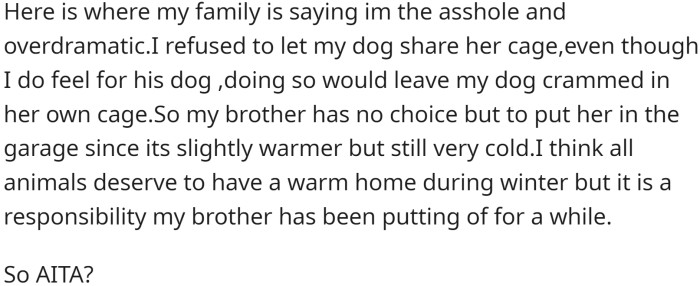
OP has offered the following explanation for why they think they might be the a-hole:

How about?

Studies from the American Journal of Animal Science suggest that the human-animal bond is deeply rooted in emotional connections, often leading individuals to prioritize their pets' well-being above family pressures.
This bond can create internal conflict when family members have differing views on animal care and responsibilities.
Addressing these differences requires understanding and compromise from both parties.
The responsibility for the dog is not on OP
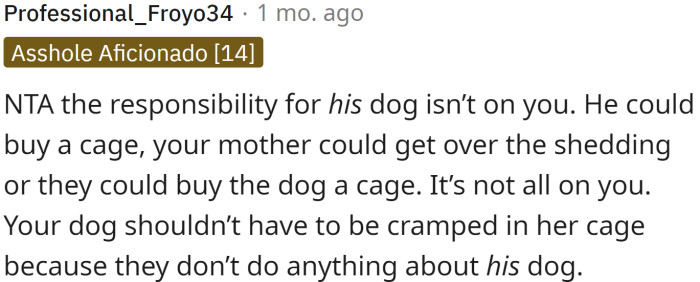
Sharing a cage could lead to some serious injuries
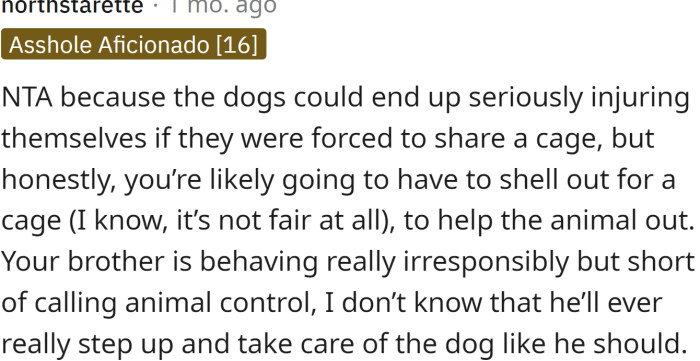
This Redditor says:
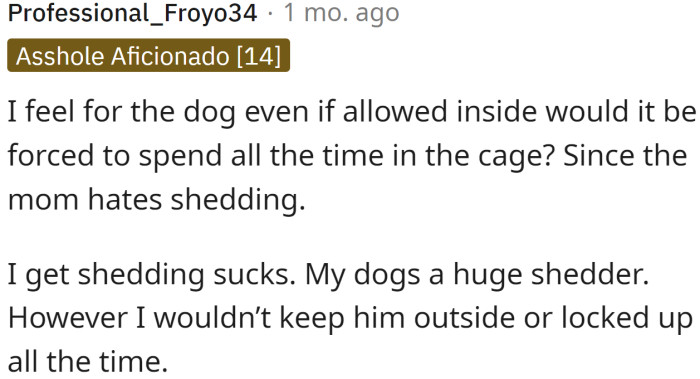
Family Dynamics and Conflict Resolution
This situation also reflects broader family dynamics, where differing values can lead to conflict.
Research in family psychology emphasizes the need for open communication when addressing divergent views on responsibilities.
When family members feel heard and understood, it can lead to more constructive discussions and solutions.
"The dog is really the only one being punished here."
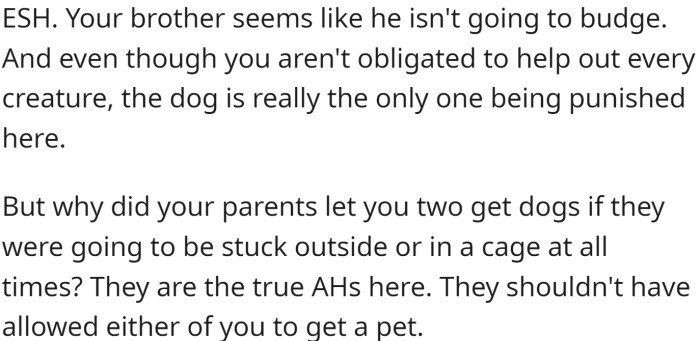
"Dogs can easily become annoyed sharing a crate"
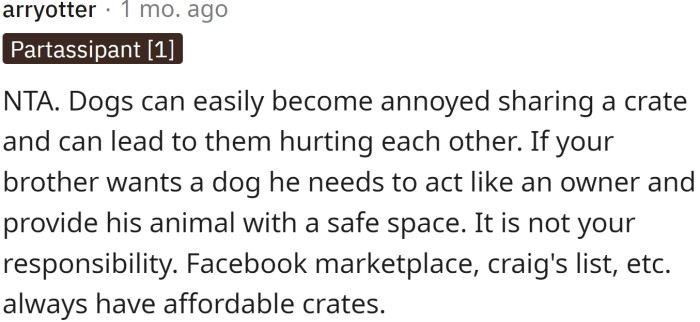
The bottom line is:

A behavioral psychologist would recommend establishing clear boundaries regarding pet care responsibilities to avoid misunderstandings.
Studies show that setting mutual expectations can reduce stress and enhance cooperation among family members.
For instance, formalizing agreements on pet care during family meetings can create clarity and accountability.
So true

This Redditor senses right:
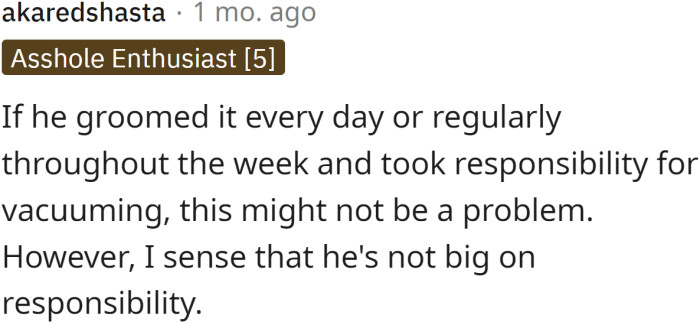
OP posted an update:

Creating Compromise through Dialogue
In situations like this, finding common ground is essential.
Facilitating family discussions that focus on shared values regarding animal care can help align perspectives and reduce conflict.
Research indicates that collaborative problem-solving leads to better outcomes and stronger family bonds.
One of the most critical responsibilities of pet ownership is providing for their basic needs, such as food, water, and shelter. Pet owners must also ensure their pets receive appropriate medical care, including vaccinations, regular check-ups, and emergency care if needed.
Additionally, pets require daily exercise and socialization to maintain their physical and mental health. However, OP's brother has failed his dog in every one of these responsibilities.
Additionally, encouraging empathy towards both the pet's needs and the family's expectations can foster a more harmonious home environment.
Practicing active listening during discussions about responsibilities can help family members feel validated and respected.
Ultimately, fostering a culture of understanding can lead to healthier family dynamics.
Psychological Analysis
This scenario highlights the tension between personal responsibility towards pets and familial expectations.
When family members have conflicting values regarding animal care, it can lead to significant stress. Encouraging dialogue around these issues can help establish a more cooperative approach to shared responsibilities.
Analysis generated by AI
Analysis & Alternative Approaches
In conclusion, navigating family dynamics regarding pet care requires understanding and compromise.
By recognizing the emotional connections we have with our pets, family members can engage in more empathetic and productive discussions.
Establishing clear roles and fostering open communication can lead to better family harmony and shared responsibility.



